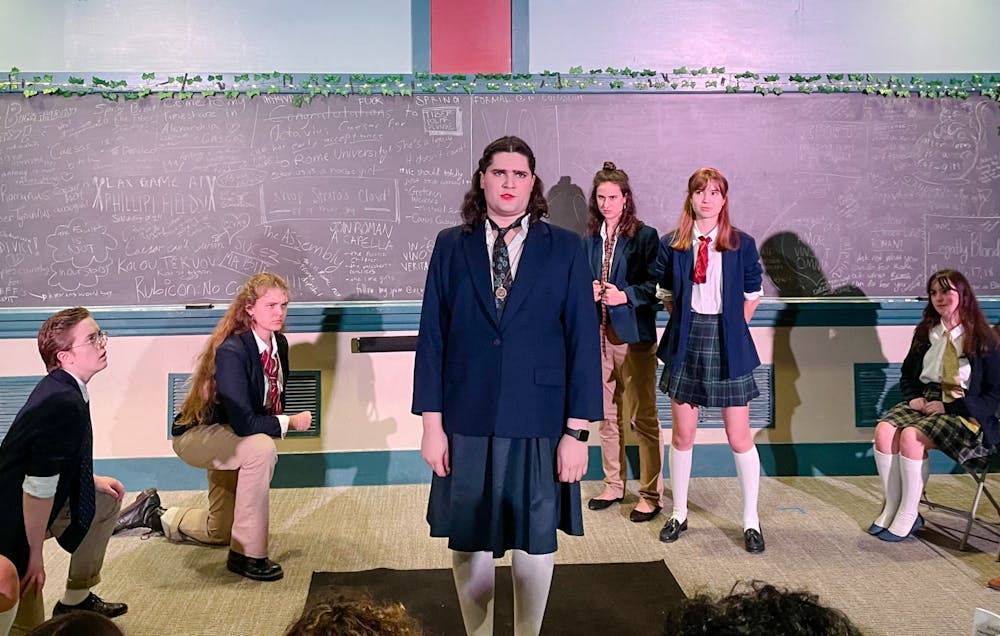Shakespeare on the Green’s production of “Julius Caesar” ran March 17 to 20 at the Solomon Center. Directed by Emily Mayo ’24, the show revived Shakespeare’s timeless play in the unique setting of a women’s college.
Mayo had the vision for this production since she played the role of Mark Antony in ninth grade production of “Julius Caesar.” “I had a lot of trouble connecting to the characters because, to me, they felt like these ancient people from the past who didn't experience life the way we do,” she said.
Mayo started writing a series of short stories to explore and connect to her character better. “And the easiest context for a 14-year-old girl was a girls’ school,” Mayo said.
Mayo also saw the opportunity to present the complexity of female friendships. “I wanted to show the positive side of friendship and how female friends aren't just weird, catty, superficial. … You can create these incredibly strong bonds, whether platonic or romantic,” she said.
To Mayo, the original play is primarily about relationships. “It's about emotional reactions to insane circumstances and it's about how people interact with each other and how relationships can go wrong,” she said, “but also how you can find these really intense bonds with people.”
Shakespeare’s language translated deftly to modern contexts, said Sita Pawar ’25, who played Cassius in the play.
“It feels very relevant to how I would talk normally,” she added. “The language is different, but the emotions and the content feel really applicable to this teenage girl setting.”
Sierra Riley ’25, who played Brutus, also noted that the potential for reinterpretation is what makes Shakespeare’s works timeless. “This is kind of an ambitious project, so it's been really cool to see how well it was thought out to begin with, but also how (Mayo) has formed it over time,” they said.
Pawar initially had hesitations about modern adaptations which can sometimes feel “pointless,” she said. “But in this, the setting is really bringing something new to the story and it's really changing the dynamics of the characters,” she said.
It was also “really fun” translating original references to a modern context, Pawar said. For example, translating Shakespeare’s characterization of Antony as a “reveler” to “party girl” or “jock” in Mayo’s version felt like a “seamless transition,” she added.
Adapting and trimming the length of the play took Mayo two months. She said she wanted to make sure that everything included in her version was relevant and necessary for a modern audience while also taking care to maintain Shakespeare’s iambic pentameter.
In her creative process, Mayo also stressed character development. “I do something called character therapy, where I get people and sit down and we'll work through individual monologues and texts,” she said. Mayo and the cast also had broader discussions about backstories and relationships between characters.
The exercise is about “using the text as a guide, but also understanding that we aren't limited to the text — that if you limit yourself to exactly what's on the page, you’re going to have flat, one-dimensional characters,” she said.
Both Riley and Pawar appreciated Mayo’s willingness to have open discussions about the characters, as well as the cast’s general collaborative spirit. “This is one of the best theater environments I've been in,” Riley said. “Even though it's such a ‘Mean Girls’-vibe story, everyone (in the cast) is so supportive of each other and really gives each other the space to explore and the encouragement to try new things with characters.”
They added that the cast’s ability to keep the atmosphere light and humorous offstage also helped them retain their energy, especially because “Julius Caesar” can be a very emotionally intense play.
The cast was comprised entirely of non-male-identifying students, which was a requirement for auditionees, and primarily underclassmen, but there were no other specific criteria in the casting process. “I didn't want to go in with any specific appearances or mannerisms in mind for any character,” Mayo said.
Mayo said she firmly believes that anyone can do Shakespeare, as long as they have a basic understanding of the material they audition with. As opposed to musicals and other plays with specific limitations such as vocal range, Shakespeare offers actors and directors lots of freedom, she said. “Anyone can see themselves in positions of power and in positions of love,” she said.
That freedom, among other things, is why Mayo believes it is important to continue performing Shakespeare even today, despite the challenges of ensuring that the emotions and relationships translate to a modern audience effectively, she said.
Mayo also noted that even with the more antiquated language, Shakespeare is more accessible than other plays, since it is free from the restrictive copyright laws restricting use of other works. “In Shakespeare, none of those issues exist, so anyone can do it whenever, wherever. And I think that is really cool that you could get 10 people together and put on a Shakespeare play on a patch of grass,” she said.
Mayo said she hopes that audience members left the play feeling connected to the characters and their relationships. She wants people to have “felt something for these people after the play, these people who are otherwise relegated to statues and busts.”
Pawar also hopes that the audience left the show sympathizing with her character. “I may not win, I may do bad things, but I kind of want you to be rooting for me,” she said.
On first reading the play, Pawar thought Cassius was “the bad guy.” But having rehearsed then performed the character multiple times, Pawar realized that “Cassius is very justified in a lot of things.”
“I am really impressed with the way it’s come together,” Mayo said. The coolest part about the production, she added, was “walking in her vision” and collaborating with the rest of the production team to turn the play into a collective reimagination shared by the entire cast and crew.





